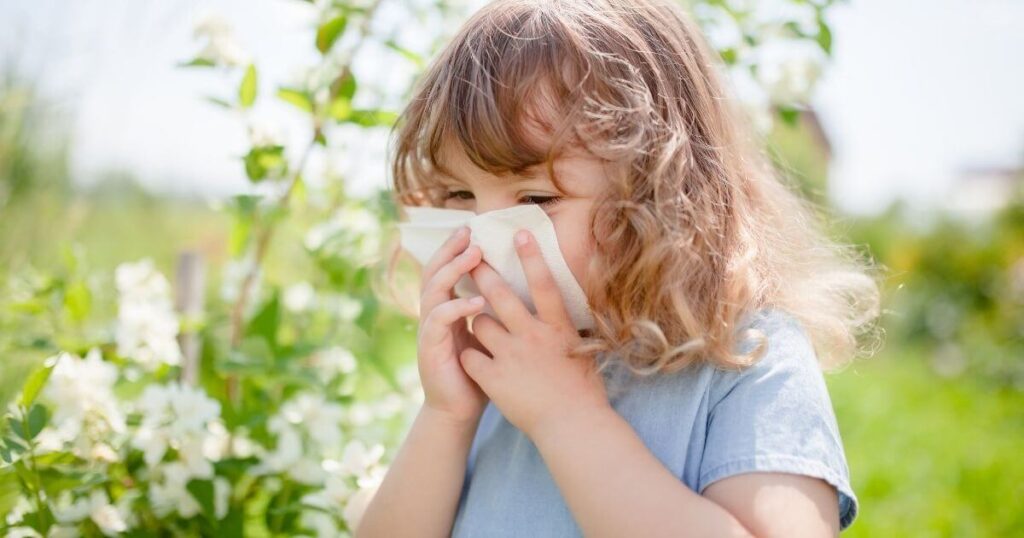Spring is officially in the air in Wisconsin! While it’s perfect for fun spring outdoor activities, it also means kids’ seasonal allergies. Seasonal allergies are “an allergic response causing itchy, watery eyes, sneezing, and other similar symptoms” according to Mayo Clinic.
These typically occur as the seasons change, however, don’t be surprised if you’re child is experiencing them year-round as well. If you’re noticing recent flare-ups and your kiddo seems miserable, multiple things could be causing these allergic reactions.
Most typically, kids’ seasonal allergies are caused by ragweed but they can also develop from other plants, trees, grass, mold, or pollen.
Signs/Symptoms Of Seasonal Allergies
The general symptoms of seasonal allergies may vary, but the most common include nasal congestion, itchy and/or watery eyes, sneezing, runny nose, fatigue, and itching. Some not-so-common symptoms may include loss of taste, coughing, throat irritation, and wheezing.
Although these sound as though they could double as COVID-19 symptoms, the best way to be sure is to consult with your doctor once these begin to occur. This will not only help in deciphering the best plan of attack for handling seasonal allergies but also help you to identify what the symptoms of kids’ seasonal allergies may or may not look like.
Children typically won’t hold back when they’re experiencing allergy discomfort. They may start to rub their eyes non-stop, their nose may begin to run for no apparent reason, and they most typically will react as though they’re enduring a common cold.
Once these signs begin to occur, it’s a good idea to talk to your child about what they’re feeling. Some good questions to ask may be: is their throat itchy, does their head feel heavy, do these feelings get worse when they’re outside?
The answers to these questions will come in handy when checking with your doctor about what exactly is causing your child’s discomfort, and it’ll help your doctor best prescribe something to help your little one.
Diagnosing Your Kid’s Seasonal Allergies
Properly diagnosing your child is the first step to helping relieve their allergy symptoms. Aside from an initial conversation with your doctor, there are a few other in-depth options to help get to the root of your child’s allergies.
Skin Test
A skin test, otherwise known as a puncture or a scratch test, is an easy way to test your child for multiple different allergens – sometimes even 50 at a time. This is a virtually painless test, using needles that barely penetrate the skin resulting in little to no blood or pain.
This process starts with the nurse cleaning the area (typically the back), placing a marker dot for each allergen being tested, placing a drop of each allergen next to their mark, and then using a different needle for each allergen to puncture the skin. If your child reacts to one, or multiple, of the allergens, using the affected areas will develop a small, itchy, red bump that resembles a mosquito bite.
The nurse will then analyze which allergens caused a reaction and which ones did not, leading to the near-perfect diagnosis of your child’s allergies.
Blood Test
The other most common way to diagnose your kiddo is with a blood test. This may cause your child a bit more discomfort, however, it typically moves much quicker than a skin test. The most common reason for choosing a blood test over a skin test is if your child has a skin condition such as hives or a rash, or is taking antihistamines.
In these cases, you may need an allergy blood test as allergy skin tests won’t deliver the most reliable results.
Treatment
Don’t fret! If your child is experiencing these common kids seasonal allergies, there are many different ways to go about treating these. Some are simple, easy, and free such as closing your windows during spring and summer, taking baths more often, and pushing for your kiddo to wash their hands intentionally and frequently.
There are also plenty of over-the-counter products and medications that can help soothe your child’s pain and reduce their symptoms. As always, consult with your doctor about which options may be right for you and your child. Your doctor may also prescribe some medications specific to your child and their needs.
Dealing with seasonal allergies isn’t any fun for everyone involved. Thankfully, there are many different ways to tackle a diagnosis and treatment plan, so this spring you and your little ones can enjoy the outdoors – without the runny noses.



